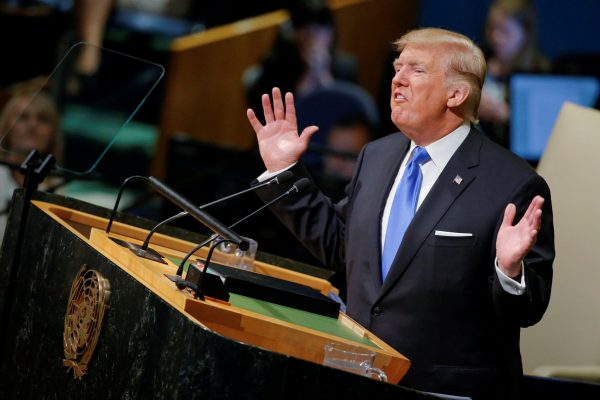While both acknowledged in strong terms the threats posed by North Korea, the language they used paled against the more pugnacious tone of the US administration. This divergence matters.
The centrality of US extended deterrence to European security means that NATO states need to be wary of straying too baldly from any strategy put forward by Washington, regardless of their views on its wisdom or likely effectiveness. They are well aware of the long-standing perception in the United States that European NATO members are not pulling their weight. They don’t need to find another reason for the White House to be poorly disposed toward them.
On the other hand, the EU has already shown its willingness to plough its own furrow, committing earlier this month to defending the Iran nuclear deal even as the United States wavers. It can do this because of the economic and diplomatic clout that the United States would like to harness when dealing with North Korea: just as Europe needs the United States to underwrite its security, the United States needs Europe if it is to marshal a truly global response to Pyongyang. If Washington wants that response to include a military element, then at some point it will turn to NATO for support.
At first sight, NATO’s role in addressing North Korean security challenges is limited. As Article VI of the North Atlantic Treaty makes clear, in order for Article V collective defence commitments to be triggered, any North Korean attack would have to be directed at the territory or forces of a NATO state within Europe or the North Atlantic area. This means that an attack on US forces in South Korea, Guam or even Hawaii would not be sufficient grounds in itself for the United States to expect NATO support, though individual NATO members might well be asked for assistance.
Of course, if Pyongyang were to attack the continental United States without provocation, NATO would undoubtedly respond. But Kim Jong-un would think twice before doing this because he already knows any such action would invite ruin. Contrary to the popular media trope, he shows no signs of behaving irrationally when it comes to national security. In the converse situation — in which the United States makes the first move absent a specific imminent threat from North Korea — European allies would rightly judge that the United States had embarked on a war of choice rather than one of necessity, and they would not feel firmly bound by alliance ties.
Rather than calling on NATO as a defensive military alliance, the United States is more likely to mobilise it to pressure and contain North Korea. Pressure here means rigorous enforcement of sanctions (which is sensible) and limiting diplomatic ties with Pyongyang (which is not). Containment means improving NATO’s defences against possible North Korean adventurism — principally cyber and missile defences — and NATO working more actively to prevent onward proliferation from North Korea. This could plausibly include (given the additional direction on maritime interdiction contained in UN Security Council Resolution 2375) an ongoing counter-proliferation operation in the model of the NATO anti-piracy mission Ocean Shield.
But there should be no mistake: Europe does not see the need for a military solution to the North Korean crisis. The apparent lack of US focus on a diplomatic solution creates a perception in Europe that the United States is in the process of talking itself into war. This may be inaccurate. But if it is then this inaccuracy is born out of the US administration’s inability to communicate a coherent strategy.
This means that Europe is wary about the end goals of US pressure — is it really designed to bring Pyongyang to the negotiating table, or to drive it into creating a casus belli? In the absence of better co-ordination, it is possible that European offers to take a role in negotiations might become more insistent. Europe might increasingly signal its dissatisfaction with US leadership on this issue, though not to the extent of seeking leadership itself. It is plausible that Europe might take the unusual step of indicating in advance (most likely privately) that it would not support preventive military action.
None of this need come to pass. But to prevent these transatlantic differences of opinion widening and hardening, the United States should be more transparent with its allies about its diplomatic strategy towards Pyongyang. It needs to earn the trust of those it might call on in a crisis, in Europe and particularly in Asia.
European leaders should continue to publicly emphasise their focus on peaceful solutions, keeping explicit disagreements private. They should attempt to persuade Washington to disavow military action against North Korea in all circumstances save those of an imminent threat — including a threat to Japan or South Korea — or an act of aggression or proliferation that if left unpunished would set an unpardonable example to others. This policy would set a firm foundation for a renewed common front toward North Korea and the global response it demands.
Tom Plant is Director of the Proliferation and Nuclear Policy Program at the Royal United Services Institute for Defence and Security Studies (RUSI).

